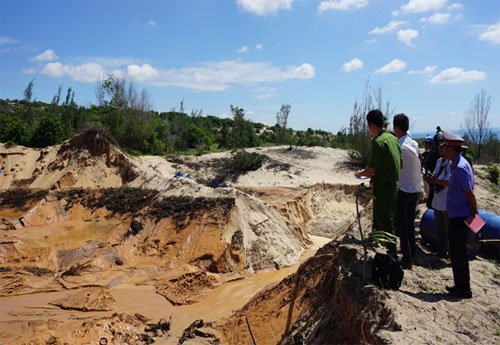VietNamNet Bridge – Binh Thuan provincial authorities have been wavering between choosing titanium mining, which brings high profits but seriously damages the environment, and ecotourism projects, which ensure sustainable growth but need a green environment.

The exploitation and processing of titanium ore in central coastal provinces have caused adverse impacts and hindered the development of other business fields. There are high risks for the environment, including the spread of radioactive substances, pollution of underground water, destruction of the protective forests and desertification.
That is the conclusion of a report from the Binh Thuan provincial authorities which was submitted to the PM after a period of implementing the government’s titanium exploitation plan.
The province in the southern part of the central region has the highest titanium reserves in Vietnam with estimated reserves of 599 million tons, or 92 percent of the nation’s total reserves. Twenty four spots, covering an area of 20,840 hectares, have been programmed to undergo exploration and exploitation activities by 2020.
However, the provincial authorities have just reported that the total output to be exploited by 2020 is 133.3 million tons on an area of 19,530 hectares only.
However, 18 programmed titanium exploitation areas are the areas reserved for the development of 37 projects in other business fields, including tourism, wind power, solar power, airport, golf course and afforestation.
The overlap between titanium mining planned areas and 37 other projects has made it impossible for investors to implement their projects.
According to the provincial authorities, most of the titanium projects are located along the coast, where the terrain is higher than other areas and surrounding residential quarters, so they are prone to environmental accidents.
In some planned titanium exploitation areas, there is not enough water for exploitation activities, while the water sources for people’s daily lives and cultivation have been seriously affected.
Because of the water shortage, farmers do not grow cashew trees and watermelons, but they only plant short-term fruits and vegetables in the rainy season.
Doan Van Canh from the Vietnam Hydrogeological Association said the mining needs large amounts of water and also discharges a huge amount of waste water. It is impermissible to pump sea water into the mining pits, or it will salinize the aquifer.
Since the titanium industry has seriously damaged the local environment and degraded the lives of local residents, the provincial authorities have asked the PM to reconsider the titanium mining plan.
Binh Thuan has proposed excluding titanium exploitation projects on six spots with total area of 1,973 hectares. If the proposal gets approval, there will be only 13 mining areas with the total area of 7,730 hectares.
RELATED NEWS
Three titanium companies ordered to stop operations
Titanium polluters face deregistration
Vu Trung